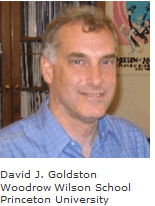|
|
|
|
|
|
|
News & Views item - September 2009 |
![]() David Goldston Sounds a Note of Caution on the US Science and Technology Budget
for Fiscal Year 2011. (September 3, 2009)
David Goldston Sounds a Note of Caution on the US Science and Technology Budget
for Fiscal Year 2011. (September 3, 2009)
 David
Goldston* is Nature's columnist who gives the journal an "insider's
take on the interaction between science and politics" in the United States. This
week he analyses a document released in August by US President Barack Obama's
administration, which although preliminary, is exercising university lobbyists.
David
Goldston* is Nature's columnist who gives the journal an "insider's
take on the interaction between science and politics" in the United States. This
week he analyses a document released in August by US President Barack Obama's
administration, which although preliminary, is exercising university lobbyists.
The US' fiscal year 2011 begins in October 2010 and drafting of the budget has already begun. It will be the first budget fully developed by the Obama administration and the president's science adviser, John Holdren, and budget director, Peter Orszag, released a memorandum on August 4 which, according to Mr Goldston places: "emphasis on tightly linking research programmes to solving what are pointedly labelled as 'practical challenges', its focus on evaluating programme outcomes with data that would be made publicly available, and its call for shifting money away from 'lower priority' areas. The document is also notable for what it omits: the term 'basic research' is never used, no mention is made of the president's commitment to double the budgets of several science agencies and no new cross-agency programmes are proposed (but see../N&V_0908/news__views_item_aug_2009-090831.htm)."
In addition there is a "vague directive that [government] agencies should work to improve 'the productivity of our research institutions, including our research universities.'"
At this stage it is anyone's guess as to the expected interpretation of the directives, and Mr Goldston sites the example of biomedical research where the memo calls for: "applying biomedical science and information technology to help Americans live longer, healthier lives while reducing health care costs." His interpretation: "The memo seems to say that mere assertions will no longer be sufficient, arguing that 'agencies have a responsibility to explain how Federal science and technology investments contribute to … improved health outcomes' and to prove it with data".
But the argument for more translational research in biomedicine is not new and was a stated priority of the immediate past director of the NIH as well as the newly installed director, Francis Collins.
And Mr Goldston does point out that "the memo does instruct agencies to 'support long-term, visionary thinkers proposing high-risk, high-payoff research' and requires agencies to come up with metrics to determine whether such research is being supported. But an emphasis on specific outcomes, which include 'job creation', can push agencies away from riskier projects".
It really is to early to try and decide which end of the dog should be believed. Up until now President Obama has indicated he has a good understanding of the importance to the nation of basic research and that the president is aware of the care required in preventing directives from becoming straight-jackets.
Remembering Mr Goldston's previous appointment of running the US House of Representatives' Committee on Science during the Bush years, the following admonishment is of consequence:
[N]o previous administration has been particularly good at figuring out how to evaluate science programmes, especially those that involve fundamental research. The administration of George W. Bush created something called the Program Assessment Rating Tool to review all programmes, but even Bush officials were cautious in applying it to basic science. In any event, the tool never gained widespread acceptance within the government, and agencies complained that budget decisions often did not take account of the ratings.
A lot of intellectual work will be needed to develop appropriate metrics — some of that is ongoing under the National Science Foundation's Science of Science and Innovation Policy effort — and to limit the burden of gathering data. And a crucial task will always be to decide how quickly an outcome should become evident — inherently an art as much as a science, and a political art at that.
We can only hope that those currently grappling with the Minister for Innovation, Industry, Science and Research, Kim Carr's Excellence in Research for Australia take note.
____________________________________________________
*David Goldston was appointed to run the House Committee on Science in January, 2001. As staff director, he oversees a committee with jurisdiction over most of the federal civilian research and development budget, including programs run by NASA, the National Science Foundation, the Department of Energy, the Department of Commerce and the Environmental Protection Agency. Currently he is Scholar in Residence at Princeton University's Program in Science Technology and Environmental Policy.